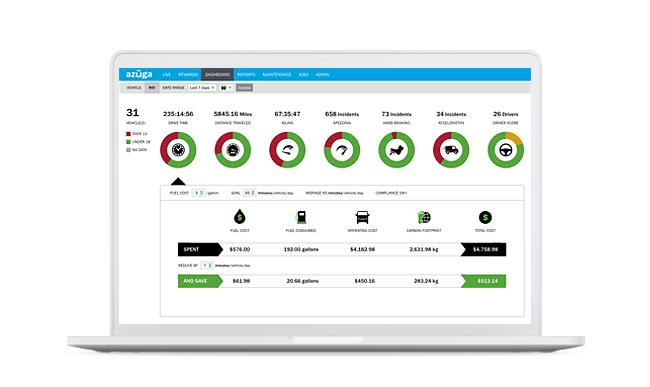
Azuga Fleet Management for Construction & Heavy Equipment
Leading construction & heavy equipment companies trust Azuga for their fleets

The Importance of Fleet Management for Construction Companies
Increase Productivity, Decrease Costs
Fleet management is the overall management of commercial motor vehicles. These types of vehicles can include, but are not limited to, cars, vans, trucks, forklifts, and other private vehicles.
Fleet management combines state-of-the-art GPS fleet tracking, telematics, vehicle maintenance alerts, and management of your fleet drivers. These systems were created to monitor your fleet vehicles and drivers while reducing costs and helping to increase profits.
Fleet management is important to keep fleet organizations running at maximum capacity. Fleet management tools allow fleet managers, admins and owners to monitor their drivers, ensure they’re taking the most efficient route, and even be notified of vehicle maintenance. Fleet management tools can help save thousands of dollars per year.
Improve safety. Gain accountability.
Count on the GPS fleet management software that's built for safety.
Limit distractions.
Add DriveSafe and block smartphone distractions—such as texting, calling, and app use—when the vehicle is in motion.
Put fleet safety first.
Take advantage of information—such as speeding, hard braking, cell phone distractions, and service warnings—to keep both drivers and vehicles performing at their best.
Put diagnostics to work.
In today’s world, data and analytics are crucial tools for any business. With our diagnostics, valuable information is captured every time your fleet is dispatched. Use it to maximize efficiency, reduce operating costs, and reward top drivers.
Log and tag trips.
When a driver uses FleetMobile, data is captured from every vehicle he or she drives, creating a comprehensive trip log. Trips can also be tagged as business or personal, allowing you to separate out the daily lunch run from work-related trips.
Tire Pressure Monitoring
Tire Pressure Monitoring System (TPMS) in your vehicle monitors the tire's air pressure continuously and alerts drivers when the pressure varies from the recommended level. TPMS is primarily designed for safety purposes. Underinflated or overinflated tires lead to a less stable ride and a higher risk of blowouts, making driving unsafe. Whenever this occurs, it will trigger an alert to the driver that the tire (or tires) needs to be inflated to the appropriate level.










